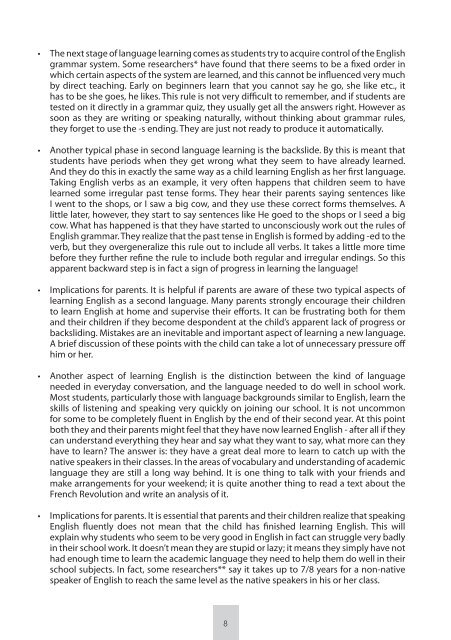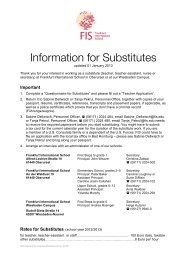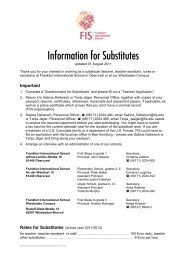English as a Second Language - Frankfurt International School
English as a Second Language - Frankfurt International School
English as a Second Language - Frankfurt International School
Create successful ePaper yourself
Turn your PDF publications into a flip-book with our unique Google optimized e-Paper software.
• The next stage of language learning comes <strong>as</strong> students try to acquire control of the <strong>English</strong><br />
grammar system. Some researchers* have found that there seems to be a fixed order in<br />
which certain <strong>as</strong>pects of the system are learned, and this cannot be influenced very much<br />
by direct teaching. Early on beginners learn that you cannot say he go, she like etc., it<br />
h<strong>as</strong> to be she goes, he likes. This rule is not very difficult to remember, and if students are<br />
tested on it directly in a grammar quiz, they usually get all the answers right. However <strong>as</strong><br />
soon <strong>as</strong> they are writing or speaking naturally, without thinking about grammar rules,<br />
they forget to use the -s ending. They are just not ready to produce it automatically.<br />
• Another typical ph<strong>as</strong>e in second language learning is the backslide. By this is meant that<br />
students have periods when they get wrong what they seem to have already learned.<br />
And they do this in exactly the same way <strong>as</strong> a child learning <strong>English</strong> <strong>as</strong> her first language.<br />
Taking <strong>English</strong> verbs <strong>as</strong> an example, it very often happens that children seem to have<br />
learned some irregular p<strong>as</strong>t tense forms. They hear their parents saying sentences like<br />
I went to the shops, or I saw a big cow, and they use these correct forms themselves. A<br />
little later, however, they start to say sentences like He goed to the shops or I seed a big<br />
cow. What h<strong>as</strong> happened is that they have started to unconsciously work out the rules of<br />
<strong>English</strong> grammar. They realize that the p<strong>as</strong>t tense in <strong>English</strong> is formed by adding -ed to the<br />
verb, but they overgeneralize this rule out to include all verbs. It takes a little more time<br />
before they further refine the rule to include both regular and irregular endings. So this<br />
apparent backward step is in fact a sign of progress in learning the language!<br />
• Implications for parents. It is helpful if parents are aware of these two typical <strong>as</strong>pects of<br />
learning <strong>English</strong> <strong>as</strong> a second language. Many parents strongly encourage their children<br />
to learn <strong>English</strong> at home and supervise their efforts. It can be frustrating both for them<br />
and their children if they become despondent at the child’s apparent lack of progress or<br />
backsliding. Mistakes are an inevitable and important <strong>as</strong>pect of learning a new language.<br />
A brief discussion of these points with the child can take a lot of unnecessary pressure off<br />
him or her.<br />
• Another <strong>as</strong>pect of learning <strong>English</strong> is the distinction between the kind of language<br />
needed in everyday conversation, and the language needed to do well in school work.<br />
Most students, particularly those with language backgrounds similar to <strong>English</strong>, learn the<br />
skills of listening and speaking very quickly on joining our school. It is not uncommon<br />
for some to be completely fluent in <strong>English</strong> by the end of their second year. At this point<br />
both they and their parents might feel that they have now learned <strong>English</strong> - after all if they<br />
can understand everything they hear and say what they want to say, what more can they<br />
have to learn? The answer is: they have a great deal more to learn to catch up with the<br />
native speakers in their cl<strong>as</strong>ses. In the are<strong>as</strong> of vocabulary and understanding of academic<br />
language they are still a long way behind. It is one thing to talk with your friends and<br />
make arrangements for your weekend; it is quite another thing to read a text about the<br />
French Revolution and write an analysis of it.<br />
• Implications for parents. It is essential that parents and their children realize that speaking<br />
<strong>English</strong> fluently does not mean that the child h<strong>as</strong> finished learning <strong>English</strong>. This will<br />
explain why students who seem to be very good in <strong>English</strong> in fact can struggle very badly<br />
in their school work. It doesn’t mean they are stupid or lazy; it means they simply have not<br />
had enough time to learn the academic language they need to help them do well in their<br />
school subjects. In fact, some researchers** say it takes up to 7/8 years for a non-native<br />
speaker of <strong>English</strong> to reach the same level <strong>as</strong> the native speakers in his or her cl<strong>as</strong>s.<br />
8

















